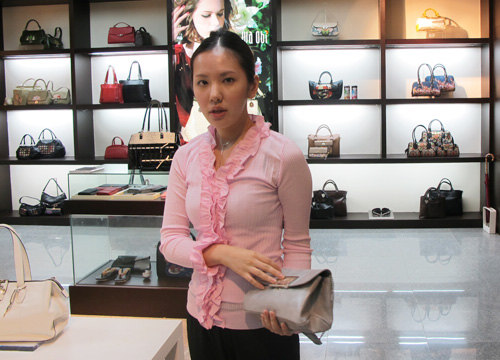|
 |
|
OWNING A BRAND: Jill Shen shows a bag that she designed at an exhibition hall of Wa Obi (ZHOU XIAOYAN) |
"We chose Xiamen to save money," said 28-year-old Jill Shen, Planning Manager of Wa Obi. "Also, we set the mainland market as our biggest target market and we are quite confident with it. The sales revenue is expected to reach 30 million yuan ($4.72 million) by 2015."
Taiwanese companies have won their market share in the mainland through market positioning and market competitiveness based on product characteristics and corporate culture.
The first Sunmile store, established near a low-end food market, failed because people in the neighborhood couldn't afford the high-quality baked goods. After Huang realized this, he immediately shut down the store and opened a new one near Gulangyu Island, where better-off natives and tourists are prevalent. The new store has found great success, with the sales revenue on the first day alone totaling 16,000 yuan ($2,516.8).
"All our 500 stores, located in different places, cater to the dietary habits of local residents. The recipe in each store is specially designed after careful study and is different from those of others," said Huang.
Wa Obi has a similar marketing strategy.
"Wa Obi is targeted at white-collar workers from 28 to 45 years old with 200,000 yuan ($31,460) yearly income," said Shen. "We offer customized designs that stand for the elegant attitude to life. Meanwhile, we use special fabric in our bags and accessories, which can be used for collection. It's an innovation in the fashion industry."
Wa Obi now has six stores, located in Beijing, Tianjin, Xiamen, Taipei and Tokyo.
Worries remain
Taiwanese companies still have reason to worry: The profit margin of traditional industries is decreasing, while it's a painful process to transform the development pattern by establishing their own high-end brands; and policy support from the government is less than a decade ago and cannot always be carried out by local authorities.
Although the sales revenue of Sunmile in 2011 exceeded 500 million yuan, the net profit is only tens of millions of yuan due to the low profit margin of the traditional food industry.
"The government used to grant overseas capital much more preferential policies than mainland capital. But now things have changed, and we are treated almost the same as ordinary private companies," said Huang.
Even if the Central Government puts forward favorable policies, there may be some obstacles and thresholds set by local governments for Taiwanese companies when those policies are implemented, said Huang.
Having its own brand may mean big money, but the process is painful.
In transforming its growth pattern, Jellery Trading has invested 4 million-5 million yuan ($629,200-$786,500) in Wa Obi and plans to retrieve its investment within seven years.
"Wa Obi started in 2009. Although with long-term preparation, the path of establishing a brand can be painful. We have 90 percent confidence in the transformation of the growth pattern from OEM to self-owned brand, and the left part depends on fate," said Shen.
Highlights of the Fourth Straits Forum
The Fourth Straits Forum was held on June 16-22 in Xiamen, a coastal city in east China's Fujian Province. The annual forum features an array of sub-forums and seminars that focus on pooling people's opinions and jointly seeking benefits across the Taiwan Straits. Being the largest platform for mainland-Taiwan exchanges, it features cultural and economic exchanges and grassroots interactions among people from all walks of life.
Jia Qinglin, a member of the Standing Committee of the Political Bureau of the Central Committee of the Communist Party of China and Chairman of the CPPCC National Committee, declared open the forum and delivered a keynote speech to the ceremony.
In his speech, Jia called for the peaceful development of cross-Straits relations and the continued opening up of new fields of cooperation. Jia called for an expansion in direct exchanges between the mainland and Taiwan, saying the mainland will carry out more favorable policies to meet the needs of Taiwan investors. He said the vigorous development of communication and cooperation has already brought concrete benefits to people from both sides of the Straits. The mainland is looking to fortify cooperation with Taiwan in many areas, including the economy, culture and tourism.
Email us at: zhouxiaoyan@bjreview.com | 